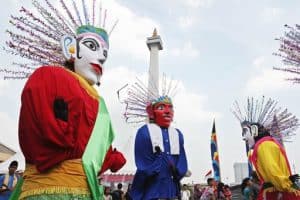 Like we all know, Jakarta is a capital city of Indonesia. Its very crowded filled, filled with business and pollution. However, beside that, Jakarta has many great cultures that you must know. Their cultures often called as Betawi Cultures. Of course, they have some speciality than the others.
Like we all know, Jakarta is a capital city of Indonesia. Its very crowded filled, filled with business and pollution. However, beside that, Jakarta has many great cultures that you must know. Their cultures often called as Betawi Cultures. Of course, they have some speciality than the others.
See also :
- Papua Culture Indonesia
- Chinese New Year in Indonesia
- History of Jakarta Indonesia
- Javanese Traditions
So what are those betawi cultures?, check them below :
1. Betawi Language
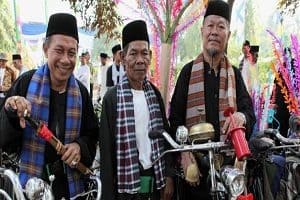 Betawi language is a creole (Siregar, 2005) language built on Malay Market added with Sundanese, Balinese, Southern Chinese (Hokkien), Arabic, and European, Portuguese and Portuguese languages. This language is brought by the people down in the early days of the development of Jakarta. Mostly by the community of slaves and merchants.
Betawi language is a creole (Siregar, 2005) language built on Malay Market added with Sundanese, Balinese, Southern Chinese (Hokkien), Arabic, and European, Portuguese and Portuguese languages. This language is brought by the people down in the early days of the development of Jakarta. Mostly by the community of slaves and merchants.
As it evolves naturally, there is no obvious standard structure of this language that distinguishes it from Malay, there are some linguistic elements of the usage that can be used from it.
See also:
- Traditional Clothes of Indonesia
- Largest Church in Indonesia
- Historical Places in Indonesia
- Indonesian Art Gallery
- Gamelan Facts
2. Tanjidor
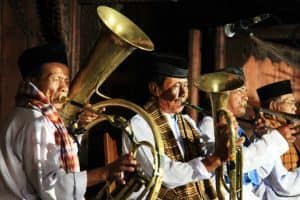 Tanjidor is one of the famous Betawi traditional music groups, music art that is played in groups is very much influenced by European music. Tanjidor music is developed by Betawi people who live in Bekasi and Karawang areas. This is also very strong in the socio-cultural life of local communities.
Tanjidor is one of the famous Betawi traditional music groups, music art that is played in groups is very much influenced by European music. Tanjidor music is developed by Betawi people who live in Bekasi and Karawang areas. This is also very strong in the socio-cultural life of local communities.
Tanjidor is a musical ensemble whose name was born during the Dutch East Indies colonization. The word “tanjidor” comes from the Portuguese word “tangedor” which means “musical instruments”. In reality, the art of “tangedor” in Portuguese is quite different from Tanjidor art in Betawi society, although the ladder system is equally diatonic. Tanjidor that developed by Betawi society is more dominated by wind instruments.
See also:
- Buddhism in Indonesia
- History of Chinese in Indonesia
- Native Plants of Indonesia
- New Years in Indonesia
- Rafting in Indonesia
- Daily Phrases in Indonesia
3. Gambang Kromong
 Gambang Kromong is a traditional musical art from Betawi with gamelan instruments and musical instruments from Tionghoa. This art of traditional music is the result of cultural acculturation between Chinese and indigenous cultures. Gambang Kromong own name is taken from the name of the two musical instruments, gambang and kromong.
Gambang Kromong is a traditional musical art from Betawi with gamelan instruments and musical instruments from Tionghoa. This art of traditional music is the result of cultural acculturation between Chinese and indigenous cultures. Gambang Kromong own name is taken from the name of the two musical instruments, gambang and kromong.
Gambang is a musical instrument made of special wood that sounds good when in the puncture or in play. Gambang replica usually has up to 18 pieces with different sizes to bring out different tones. While Kromong is a musical instrument made of bronze.
The shaped like a gamelan tool in general, the number of kromong itself usually counted to 10 pieces (ten pencon). Kromong is also a musical instrument that is played by the way it is at, and each pencon also has a different tone.
See also :
- Longest River in Indonesia
- Highest Mountain in Indonesia
- Haunted Places in Indonesia
- Largest Lakes in Indonesia
- Oldest Temple in Indonesia
4. Yapong Dance
 Yapong dance was first created by Bagong Kusudiardjo in 1975. This dance is usually held when approaching the birthday of the city of Jakarta. Well, in that time, the Department of Culture usually preparing some local dance from various parts of Indonesia.
Yapong dance was first created by Bagong Kusudiardjo in 1975. This dance is usually held when approaching the birthday of the city of Jakarta. Well, in that time, the Department of Culture usually preparing some local dance from various parts of Indonesia.
Until now this dance is typical of traditional Betawi dance, the instruments used in this dance are Rebana Biang, Rebana Ketimpring and Rebana Hadroh. Along with the times, yapong also becomes the way to combine traditional and modern into contemporary art.
See also:
5. Betawi Mask Dance
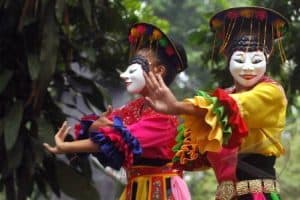 Betawi Mask Dance is a combined artwork of drama art, singing and dancing. Its loos like at theater, but its a dancing. A little bit confused? Formerly Mask Dance is one of the traditional teather performances, but took the elements of dance art in it until finally looks like now.
Betawi Mask Dance is a combined artwork of drama art, singing and dancing. Its loos like at theater, but its a dancing. A little bit confused? Formerly Mask Dance is one of the traditional teather performances, but took the elements of dance art in it until finally looks like now.
This dance has been recognized by foreign countries you know, you can see this dance when there are ceremonies and weddings. In the development of this dance, this dance may get even bigger and more famous around the globe.
Read these too :
6. Sirih Kuning Dance
 The name of Sirih Kuning allegedly used in the ancient times when the procession of traditional wedding, sirih kuning is given from the prospective groom to the prospective bride. It developed into a dance from the origin from dance cokek betawi.
The name of Sirih Kuning allegedly used in the ancient times when the procession of traditional wedding, sirih kuning is given from the prospective groom to the prospective bride. It developed into a dance from the origin from dance cokek betawi.
This dance usually shows a pair of female and male dancers. But along with the times, this dance is often carried by children and does not demand one pair of couple again. The music that accompanies this dance is Gambang Kromong.
You might want to see these :
7. Lenggang Nyai Dance
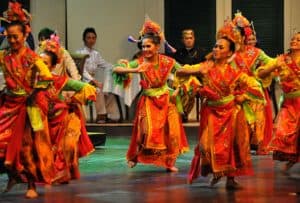 This dance is called Lenggang Nyai because it tells the story of Nyai Dasimah. The girl from Jakarta who is confused to choose a spouse between Dutch and Indonesian men. She finally choose a Dutch man, but throughout her marriage, Nyai revolted because of the rules made by her husband.
This dance is called Lenggang Nyai because it tells the story of Nyai Dasimah. The girl from Jakarta who is confused to choose a spouse between Dutch and Indonesian men. She finally choose a Dutch man, but throughout her marriage, Nyai revolted because of the rules made by her husband.
Feeling the rights of women taken, the story finally inspired an artist named Wiwiek Widiastuti and made a dance called Lenggang Nyai Dance.This dance uses Gambang Kromong music, and a red colored costume with head jewelry. If you notice there is a little nuance of Chinese tradition.
See also:
8. Japin Dance
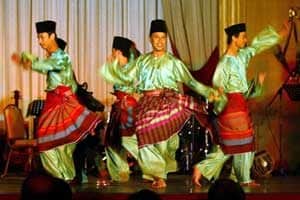 Japin or Zapin Betawi Dance is a mixed dance of Malay dance influenced by Arab culture. This dance is so popular by many people, as you can see this dance is also a dance tradition Malaysia. So, this dance comes from which area? Betawi or Malaysia?
Japin or Zapin Betawi Dance is a mixed dance of Malay dance influenced by Arab culture. This dance is so popular by many people, as you can see this dance is also a dance tradition Malaysia. So, this dance comes from which area? Betawi or Malaysia?
If we trace the history of Zapin Dance, this dance was originally Malay traditional dance, but at that time around the 16th century this dance was brought by arab traders to spread da’wah in the middle of musical accompaniment. Until finally Zapin dance is divided by several groups in several countries.
See also:
9. Cokek Dance
 The next traditional dance is Cokek Dance. This dance is similar to Chinese dance, the music used is gambang kromong commonly used to accompany various other traditional dances. Cokek Dance Dancer uses a special kebaya called kebaya cokek.
The next traditional dance is Cokek Dance. This dance is similar to Chinese dance, the music used is gambang kromong commonly used to accompany various other traditional dances. Cokek Dance Dancer uses a special kebaya called kebaya cokek.
Unique thing in this dance, the dancers will tune the shawl to the guests, and it is strictly forbidden for guests to refuse the scarf. Then, the guest have to dance. Sounds interesting isn’t it?
See also :
10. Nyorog Tradition
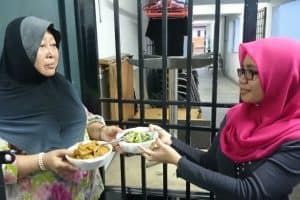 In Betawi, the tradition is known as nyorog or distributing foods to family members or neighbors. This habit is done before the coming of Ramadan. Now, the term nyorog is probably almost extinct because this tradition has begun to disappear. However, the tradition of nyorog changed with the tradition of sending gifts to relatives. The parcels usually contained basic foods, syrup, and cakes.
In Betawi, the tradition is known as nyorog or distributing foods to family members or neighbors. This habit is done before the coming of Ramadan. Now, the term nyorog is probably almost extinct because this tradition has begun to disappear. However, the tradition of nyorog changed with the tradition of sending gifts to relatives. The parcels usually contained basic foods, syrup, and cakes.
In this tradition, relatives often carry unique foods of Betawi. The food is vegetable cork pucung. Vegetable pork cork based on fried cork fish and then cooked using various spices such as pecan, red chili, ginger, and turmeric.
You may take a look at :
11. Kebaya House
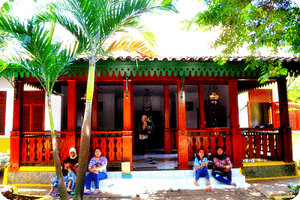 There are 3 kinds of traditional houses of Betawi, namely kebaya house, joglo house and gudang house. However, the official recorded as a traditional house of the Betawi tribe in DKI Jakarta is kebaya house. Called kebaya house because of the shape of the roof that resembles a folded saddle and when viewed from the side then the folds look like kebaya folds.
There are 3 kinds of traditional houses of Betawi, namely kebaya house, joglo house and gudang house. However, the official recorded as a traditional house of the Betawi tribe in DKI Jakarta is kebaya house. Called kebaya house because of the shape of the roof that resembles a folded saddle and when viewed from the side then the folds look like kebaya folds.
The hallmark of this house is a large terrace that is useful to welcoming guests and become a place of family to relax. In the ancient times, the Betawi people make wells in front of their house and the cemetery that is beside the house.
The walls of this house made of panels that can opened and shifted to the edge. This is intended to make the house feel more spacious.
See also :
12. Ondel-Ondel
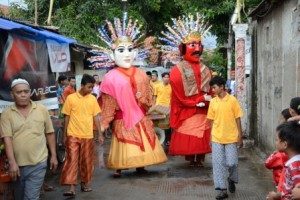 Ondel-ondel is a form of Betawi folk performances that are often featured in folk parties. It seems that ondel-ondel plays an ancestor or ancestor who always guards his grandchildren or residents of a village. Ondel-ondel in the form of a large doll was about 2.5 meters tall with a diameter of ± 80 cm, made of woven bamboo is prepared so that easily borne from it. The face is a mask or mask, with head hair made from fibers.
Ondel-ondel is a form of Betawi folk performances that are often featured in folk parties. It seems that ondel-ondel plays an ancestor or ancestor who always guards his grandchildren or residents of a village. Ondel-ondel in the form of a large doll was about 2.5 meters tall with a diameter of ± 80 cm, made of woven bamboo is prepared so that easily borne from it. The face is a mask or mask, with head hair made from fibers.
The ondel-ondel faces of men are usually painted in red, while the women are white. This form of performance is much in common with that in some other areas.
You might see :
13. Pencak Silat
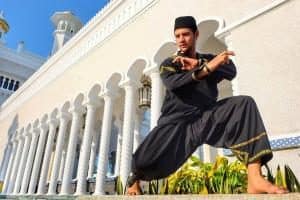 Pencak silat or silat is a traditional martial art originating from Indonesia. This martial art is widely known in Indonesia, Malaysia, Brunei, and Singapore, southern Philippines, and southern Thailand in accordance with the spread of various ethnic groups of the archipelago.
Pencak silat or silat is a traditional martial art originating from Indonesia. This martial art is widely known in Indonesia, Malaysia, Brunei, and Singapore, southern Philippines, and southern Thailand in accordance with the spread of various ethnic groups of the archipelago.
Thanks to the role of coaches from Indonesia, now Vietnam has also had a tough fighters. Mother of Pencak Silat Indonesia (IPSI) is the Indonesian Pencak Silat Association (IPSI). The organization that embraces pencak silat federations in different countries is the Pencak Silat Between Nations (Persilat), formed by Indonesia, Singapore, Malaysia and Brunei Darussalam.
See also :
14. The Legend of Si Pitung
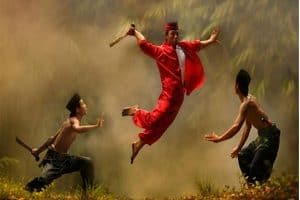 Si Pitung is one of the Betawi warriors from Rawabelong village, West Jakarta. Besides Si Pitung describes the figure of warriors who like to defend the truth in the face of injustice caused by the ruler of the Dutch East Indies at that time. The story of Si Pitung warrior is believed to be real existence by prominent Betawi people especially in Kampung Marunda area where there are old houses and mosques.
Si Pitung is one of the Betawi warriors from Rawabelong village, West Jakarta. Besides Si Pitung describes the figure of warriors who like to defend the truth in the face of injustice caused by the ruler of the Dutch East Indies at that time. The story of Si Pitung warrior is believed to be real existence by prominent Betawi people especially in Kampung Marunda area where there are old houses and mosques.
Pitung which became character as Robin Hood Betawi version developed by Lukman Karmani (Till, 1996). Karmani wrote Si Pitung novel. In this novel, Narrated Si Si Pitung as a social hero. According to Rahmat Ali, ‘Pitung as a character of the Betawi story of the past is known as a robber, but the result of robbery is used to help suffering people.
He is Robin Hood Indonesia. Nevertheless the authorities do not tolerate, the guilty person must still be given the appropriate punishment.
Read these too :
15. Roti Buaya / Crocodile Bread
 Bread of crocodile have an important role in traditional marriage Betawi, even arguably the law is mandatory. Typically, bread that has a length of about 50 centimeters brought by the bridegroom to be given to the bride in marriage or for indigenous Jakarta residents.
Bread of crocodile have an important role in traditional marriage Betawi, even arguably the law is mandatory. Typically, bread that has a length of about 50 centimeters brought by the bridegroom to be given to the bride in marriage or for indigenous Jakarta residents.
In addition to crocodile bread, the bridegroom also provides dowry, jewelry, cloth, kebaya clothes, slippers, beauty tools, as well as some household appliances. From a number of goods delivered, crocodile bread occupies the most important position. In fact, practically mandatory.
See also :
Okay, that’s it the top 15 Betawi Culture. Culture is an important thing in our life, so we must keep it, and make it save by keep remembering and applying it in our life. Have a great day everyone.
